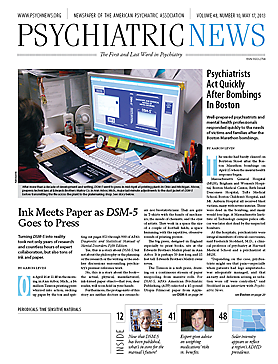The smoke had barely cleared on Boylston Street after the Boston Marathon bombings on April 15 when the mental health response began.
Massachusetts General Hospital (MGH), Brigham and Women’s Hospital, Boston Medical Center, Beth Israel Deaconess Hospital, Tufts Medical School, Boston Children’s Hospital, and Mt. Auburn Hospital all received blast victims, many with severe injuries. Three were dead in the bombing, and many would lose legs. A Massachusetts Institute of Technology campus police officer was later shot dead by the suspected bombers.
At the hospitals, psychiatrists were integral members of critical-care teams, said Frederick Stoddard, M.D., a clinical professor of psychiatry at Harvard Medical School and a psychiatrist at MGH.
“Depending on the case, psychiatrists might see that pain—especially when patients had legs amputated—was adequately managed, and that anxiety and delirium arising as sedation wore off were controlled,” said Stoddard in an interview with Psychiatric News.
They also sought to manage the acute stress generated by the bombing and the severe injuries suffered by many in the path of the explosions, he added. Patients who lost limbs might also need help with body-image problems. Stoddard is a coauthor of the book Disaster Psychiatry: Readiness, Evaluation, and Treatment (American Psychiatric Publishing, 2011).
Psychiatrists also worked closely with nurses and social workers to help victims’ families when they came to the hospital, said Todd Holzman, M.D., a Boston child and adult psychiatrist and the Massachusetts Psychiatric Society’s (MPS) liaison for disaster issues. Mental health professionals also helped to connect patients and their families with community support services as they were discharged from the hospitals.
The MPS quickly posted educational materials for its members and others on its Web site.
Preparation was a key to the area’s disaster response said both Stoddard and Holzman.
“In disaster preparation and in training drills, we’re not just sharing technical expertise with others,” said Holzman. “We’re building collaborative relationships and trust with police, fire fighters, emergency medical technicians, the National Guard, and the Red Cross that help when a real event occurs.”
Mass-casualty events place a level of stress on first responders and hospital acute-care teams to which they are unaccustomed. “I talked to a lot of firefighters, police, and emergency medical technicians who were right around the bombing site,” said Holzman. “Many said they didn’t know what was coming next, if there would be more explosions.”
They also felt an initial conflict of loyalties, knowing that family or friends were in the immediate area of the bombing, he said. “But all of them told me they just wound up doing what they were trained for.”
He expects that as time passes, reminders of the bombing will be triggered by sights, sounds, or memories of the day.
Runners, spectators, first responders, and hospital personnel will eventually find it helpful to discuss the event with others who lived through the marathon bombings and its aftermath, said Holzman. “People feel a great sense of relief knowing that others are experiencing the same thing and that it’s not abnormal.”
The effects will not be confined to Boston, he noted. Runners came from across the country and around the world for the marathon. Some were injured, and many never finished, so they (and the communities from which they came) will feel some effects too.
The car chase into the suburb of Watertown that left one bomber dead and another on the run shut down much of the Boston area for a day, until one suspect was dead in a police shootout and the second was captured. That community-wide experience brought the consequences off the television screen and into the homes of millions of area residents.
People experiencing psychological reactions to the week’s events will probably visit local clinics or doctors’ offices, said Stoddard. The Massachusetts Medical Society has already requested help with training and education for physicians on the mental health outcomes of the week’s events.
In a more direct approach, child psychiatrist Eugene Beresin, M.D., wrote on his blog for Boston public radio station WBUR about problems that many Boston-area residents likely faced after the bombing and the citywide lockdown.
Beresin, medical director of the MGH child and adolescent psychiatry outpatient clinic and co-director of the hospital’s Center for Mental Health and Media, addressed ways parents could talk with their children about the bombings, how they might cope with kids kept indoors all day, how they could cope with their own stresses, and what to look for over time in children’s longer-term reactions to the events of the week.
Psychiatric and emotional problems are too frequently stigmatized in society, Beresin told Psychiatric News. Psychiatrists must respond quickly to events with pragmatic advice and without jargon. “We have to reassure people, explain what to look for, and help them engage with others to get support,” said Beresin. ■
